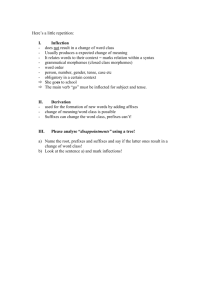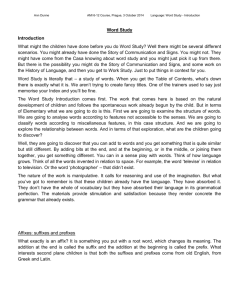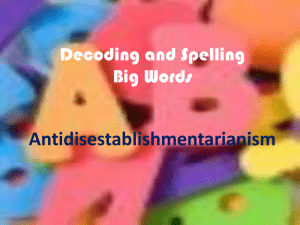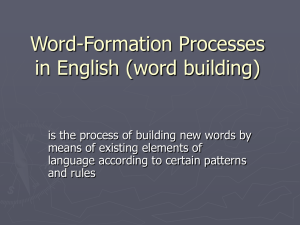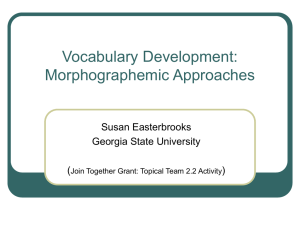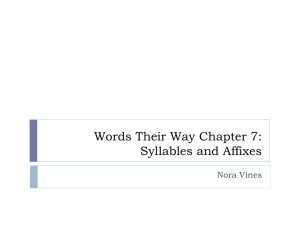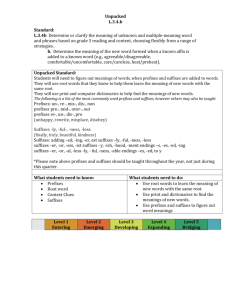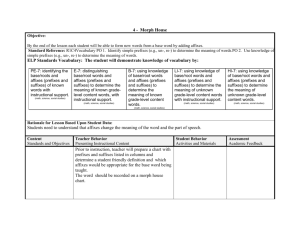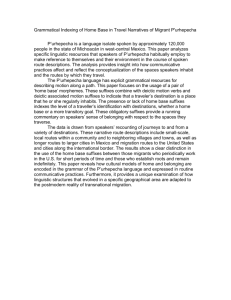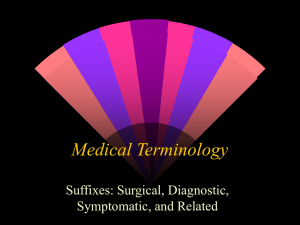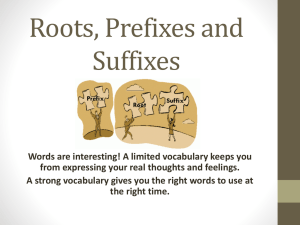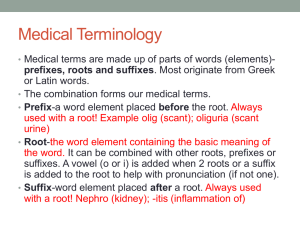Word Structure & Formation: Morphology in English
advertisement
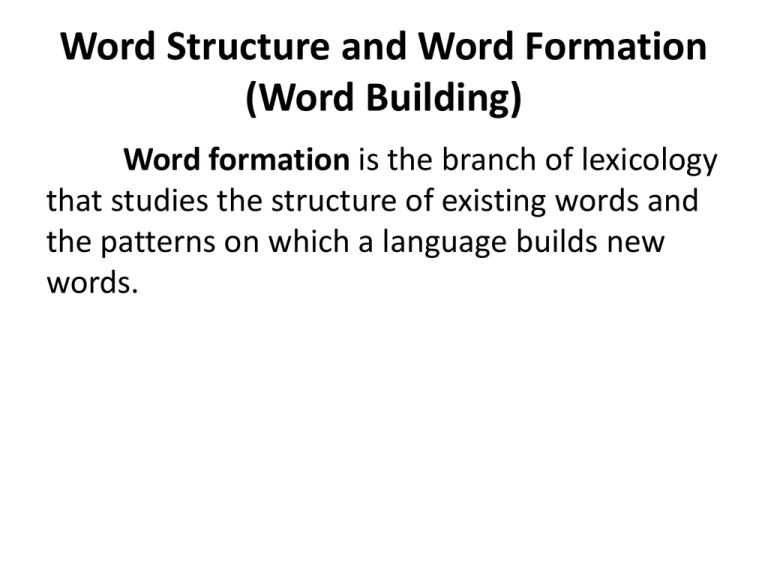
Word Structure and Word Formation (Word Building) Word formation is the branch of lexicology that studies the structure of existing words and the patterns on which a language builds new words. Morphemes The morpheme (Gr. morphe “form” + -eme “the smallest distinctive unit”) is the smallest meaningful unit of language. • Morphemes do not occur as free forms but only as constituents of words. • They possess meanings of their own. Classes of morphemes • Roots (or radicals) • Affixes The root is the morpheme that expresses the lexical meaning of the word, e.g. teach – teacher – teaching. Affixes are morphemes that modify the meaning of the root. An affix added before the root is called a prefix (e.g. unsafe, mispronounce); and an affix added after the root is called a suffix (e.g. heartless, kindness). Suffixes and inflexions Inflexions are morphemes used to change grammatical forms of the word: e.g. to work – works – worked – working. Inflexions carry grammatical meaning of the word. Types of word-forming (wordbuilding) in the English language • Affixation • Conversion • Word-composition Affixation The process of affixation consists in coining a new word by adding an affix or several affixes to a base. A base (stem) is the form to which an affix is added. E.g. blacken; unmanageable Words produced by the process of affixation are called derived words or derivatives (производное слово, дериват). Affixation • Prefixation: usual (adj.) – unusual (adj.) • Suffixation: care (n.) – careless (adj.) Classification of suffixes • Origin: Native (-er, -dom, -ship, -ness), French (-ance, -ment, -age), Latin (-tion, -ate, -ute), Greek (-ism, -ize), etc. • Meaning, e.g. –er: the agent of the action (worker, driver); -ess: feminine gender (lioness, governess); -ry and –dom: collectivity (peasantry, officialdom); -ish: insufficiency of quality (greenish – зеленоватый, youngish – моложавый). Classification of suffixes (continued) • Part of speech, e.g. noun-forming suffixes: – er, -ness, -ment (teacher, tenderness, government); adjective-forming suffixes: –ish, -ful, -ess, -y (bookish, meaningful, careless, cloudy); verb-forming suffixes: -ate, -fy, -ize (facilitate, terrify, socialize), adverb-forming suffixes: -ly, -ward, -wise (quickly, upward, likewise), etc. Classification of suffixes (continued) • Productivity, i.e. the ability to make new words. Productive affixes are ones, which take part in deriving new words in this particular period of language development, e.g. –er, -ing, -ness, -y, -ish, -able, -ate, etc. Non-productive suffixes are those which are not able to form new words in the period in question, -th (truth), -hood (childhood), -ship (scholarship). NB! Productivity ≠ frequency of occurrence. E.g. suffixes –ful, -ly, -ant, -ent, -al are frequent but non-productive. Classification of prefixes • Origin: Native (un-), Latin (ab-, bi-, de-, super-) • Meaning, e.g. negative prefixes: un- (ungrateful), non- (nonpolitical), in- (incorrect), dis- (disloyal), a- (amoral); prefixes of time and order: fore(foretell), pre- (pre-war), post- (post-war), ex- (expresident); prefixes of size and degree: hyper(hyperactive), mega- (mega-mall), mini(minivan), super- (superman), ultra- (ultrathin); prefix of repetition: re- (rebuild, rewrite), etc. Classification of prefixes (continued) • Productivity, i.e. the ability to make new words, e.g. un-, re-, dis- are productive. Conversion • Conversion consists in making a new word from some existing word by changing the category of a part of speech, while the morphemic shape of the original word remains unchanged, e.g. work – to work, paper – to paper. Properties of the converted words • The new word acquires a meaning, which differs from that of the original one though it can be easily associated with it, e.g. yellow - to yellow • The converted word also acquires a new paradigm and a new syntactic functions, which are peculiar to its new category as a part of speech. Properties of the converted words Paradigm garden Functions -s (plural) Subject -’s (possessive case) Object -s’ (possessive case, Predicative (именная часть составного plural) сказуемого) to garden -s (3d person sing.) -ed (Past Indef., Predicate Past Participle) -ing (Pres. Part., Gerund) The most common types of conversion in English • Verbs derived from nouns: to ship, to dog (преследовать), to wolf (жадно есть) • Nouns derived from verbs: a try (попытка), a catch (улов), a find (находка), a cut (порез) • Verbs derived from adjectives: to pale (бледнеть), to empty (опустошить), to grey (седеть), to tidy (привести в порядок) Less common types of conversion in English • nouns derived from adjectives: a bitter (горечь), the poor, a final • verbs/nouns derived from prepositions: out (e.g. diplomats were outed from the country; ins and outs – входы и выходы). Types of semantic relations between the converted word and the original word • The name of tool – an action performed by this tool: hammer – to hammer, brush – to brush, nail – to nail • The animal name – action typical to this animal: monkey – to monkey (обезьянничать), wolf – to wolf (жадно есть) • Part of body – action performed by it: back – to back, hand – to hand, shoulder – to shoulder • Name of occupation – an action typical of it: cook – to cook, nurse – to nurse • The name of a place – the process of occupying the place: room – to room, place – to place, etc.
